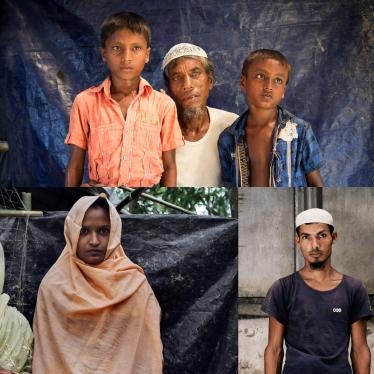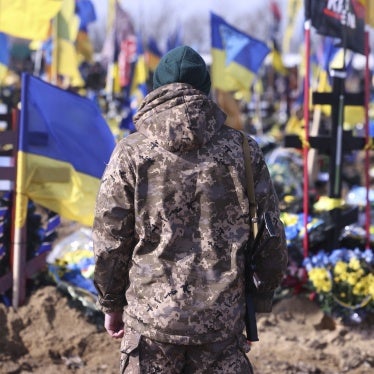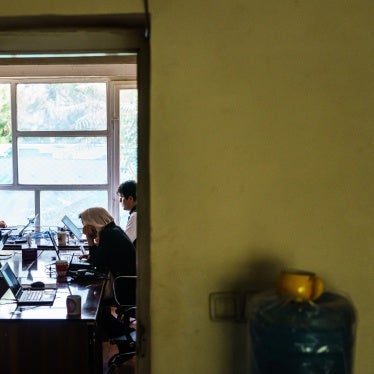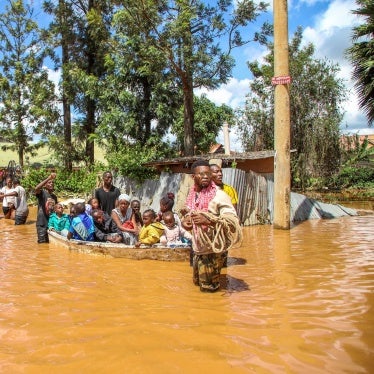(New York) - Human Rights Watch called Indonesia's indictment today of senior officials for crimes against humanity a positive development, but said serious questions remained about the government's commitment to accountability for the 1999 violence in East Timor.
Seven men, including three senior officials, were charged with genocide and crimes against humanity for a massacre in a church in Suai, East Timor on September 6, 1999, in which at least fifty people were killed.
"Unfortunately, the government's commitment to justice remains in doubt," said Sidney Jones, Asia director of Human Rights Watch. "The judges were poorly chosen, the prosecutors have shown no interest in accountability, the defense is likely to take advantage of an array of legal loopholes - and the suspects haven't even been detained."
Altogether seven men have been charged with genocide and crimes against humanity under Law 26/2000. They are: the former police commander of East Timor Brig. Gen. (then Col.) Timbul Silaen; the former governor of East Timor, Abilio Osorio Soares; Col. Herman Sedyono, the former bupati (head) of Covalima district in which the town of Suai is located; Lt. Col. Lilik Koesherdiyanto, the district military commander; Capt. Ahmad Samsudin, the district military chief of staff; Lt. Sugito, the subdistrict military commander for the town of Suai; and Lt. Col. Gatot Subiakto, the police chief of Suai. There is no indication when trials might begin.
All seven will be tried before an ad hoc human rights court, with specially chosen judges. Law No.26/2000, which authorizes the establishment of ad hoc courts, also authorizes the appointment of non-career judges. Many Indonesians hoped this would permit human rights lawyers or others with real human rights expertise to be appointed. Instead, the Supreme Court used a regulation that only members of university law faculties could be appointed as non-career judges. Twelve obscure academics were appointed as a result, some of whom had associations with senior army officers. Only one of the judges is believed to have any particular expertise in international human rights law, and he is one of those with ties to the military.
Human Rights Watch also expressed concern with the prosecutors handling the case. Indonesia's current Attorney-General, M.A. Rahman, who served in the previous government as deputy attorney-general responsible, among other things, for investigating human rights crimes, was obstinately unhelpful with respect to requests for cooperation from U.N. prosecutors in East Timor.
"Mr. Rahman showed no interest in accountability for crimes in East Timor before he became Attorney-General," said Jones, "and there is no indication that his attitude has changed."
Several legal loopholes are cause for concern. A constitutional amendment passed in August 2000 bans retroactive applications of laws, and while crimes against humanity are considered under international human rights law to be exempt from such restrictions, it is not clear that Indonesian jurists will take that view. The definition of crimes against humanity used in Law 26/2000 was improperly translated from the Rome Statute for the International Criminal Court, and instead of defining such crimes to include a "widespread or systematic attack directed against any civilian population", the Indonesian law uses the phrase "widespread or systematic attack directly on the civilian population." That wording may make it more difficult to convict defendants who were not actually present at the scene of the massacre. Finally, the presidential decision setting out the mandate for this ad hoc tribunal authorizes the court to try cases that occurred in April 1999 and after the referendum of August 30, 1999. By restricting its jurisdiction to crimes that occurred in those periods, prosecutors may not be able to get at the broader patterns of state policy and practice that contributed to the violence.
Background
The initial investigation on which the indictments were ultimately based was carried out in late 1999 by a special commission of inquiry set up under the then still reputable Indonesian Human Rights Commission. In its report of January 31, 2000, the special commission said that events leading to the Suai massacre began on September 4, the day the results of the U.N.-organized referendum were announced in which almost 80 percent of the population chose independence. On that day, the report notes, there was an attack by the local militia,known as Laksaur, and Indonesian soldiers on a neighborhood in Suai that led hundreds to seek refuge in Our Lady of Fatima church in Suai. On the evening of September 5, the military and militia began burning houses and government buildings in the town. On September 6, they began forcing people from their homes. The subdistrict commander, Lt. Sugito, was specifically named as one of those who took part in the burning and looting of houses.
About 2:30 p.m. on the afternoon of September 6, the report says, members of the Indonesian army and police, as well as men from the Laksaur and Mahidi militias, led by Lt. Sugito and the bupati of Suai, Herman Sediono, directly attacked the church. A priest named Father Hilario was shot in the chest and died; Father Francisco, another priest, was stabbed and hacked to death. An Indonesian priest, Father Dewanto, was also murdered. Of the more than 100 people who had taken refuge in the church, at least fifty are believed to have died. Twenty-six bodies were later put on trucks under the direction of Lt. Sugito and taken across the border to West Timor where they were buried.
In addition to today's indictments, eleven others have been prepared against former regional military commander Maj.Gen. Adam Damiri; Dili-based army commander Brig.Gen. (then Col.) Tono Suratman; his successor, N. Noer Muis; militia leader Eurico Guterres; Endar Prianto; Herman Gultom; Sujarwo; intelligence chief Yayat Sudrajat; Asep Kuwani; Adios Solofo; and militia leader Leonito Martins. They will be charged, among other things, for involvement in another church massacre in Liquisa on April 6, 1999.






